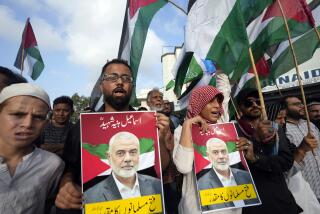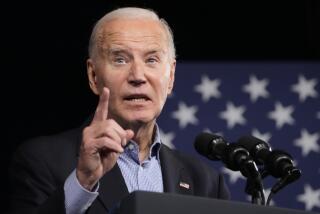Bush Praises Arafat’s Response
- Share via
WASHINGTON — WASHINGTON -- President Bush pressured Israeli Prime Minister Ariel Sharon on Wednesday to moderate his response to the latest suicide bombing and praised Palestinian Authority President Yasser Arafat’s condemnation of terrorism as “incredibly positive.”
The president spoke forcefully at the start of a meeting with King Abdullah II of Jordan, signaling concern that the bombing would put at risk recent halting steps toward peace. The explosion Tuesday night killed 16 people, including the bomber.
“Whatever response Israel decides to take, my hope, of course, is that the prime minister keeps his vision of peace in mind,” Bush said.
Bush said he had read a translation of Arafat’s statement in Arabic, broadcast on Palestinian television, in which Arafat said he had ordered security forces to prevent terrorist attacks on Israeli civilians.
“I thought that was an incredibly positive sign,” Bush said. “I hope that his actions now match his words.”
A current of deep skepticism has run beneath Bush’s statements about Arafat, and his remarks Wednesday contrasted sharply with his frequent denunciation of the Palestinian leader.
The Jordanian king urged Bush to mobilize a peace conference to settle all disputes between Israel and the Arab world, and not just those involving the Palestinians, senior Jordanian officials said.
They said the king also told Bush that Arafat must be included in the peace process--a step that Sharon has strongly resisted.
Speaking to reporters during a photo session, Bush said he was in the midst of a series of contacts with Mideast leaders to try to “seize the moment to bring peace to the region.” On Tuesday, the president met in the Oval Office with Sharon and spoke on the telephone with Crown Prince Abdullah of Saudi Arabia and President Hosni Mubarak of Egypt.
King Abdullah, encouraging greater U.S. involvement, said he hoped the talks “can find a road map to have America’s support to bring Israelis and Palestinians the peace that they deserve.”
He also encouraged fellow Arabs, specifically Mubarak and Crown Prince Abdullah, who are meeting with other Arab leaders this weekend, “to really step up to the plate, and move forward with the responsibility that we need from them.”
Bush administration officials said they had not specifically told Israel to limit its response to the suicide bombing, and they were uncertain what to expect.
“The big variable right now is what Israel will do and how bad it will be,” said a State Department official who spoke on the condition of anonymity. “The longer the wait, the bigger danger it is a larger one.”
U.S. officials cast doubt on the possibility that the peace process can move quickly to take on a broad agenda--exactly the path King Abdullah was advocating.
“Nobody is talking about trying to go from zero to 100 here, where you’re having full-scale final status talks and people are sitting around in working groups talking about the future of Jerusalem. Nobody thinks that’s where we are,” a Bush administration official said.
Abdullah brought to the White House three key messages, his foreign minister, Marwan Muasher, said in an interview.
Muasher said any peace conference must aim for an overall settlement rather than one that deals in stages with security, economic issues and rebuilding the Palestinian Authority. He said moderate Arab leaders were prepared to try to translate into tangible proposals their offer to normalize relations with Israel in exchange for Israeli withdrawal of territory occupied since the 1967 Mideast War.
“The Arabs are willing to do our part. We want to show we are following through with solid recommendations,” Muasher said.
Times staff writer Doyle McManus contributed to this report.
More to Read
Sign up for Essential California
The most important California stories and recommendations in your inbox every morning.
You may occasionally receive promotional content from the Los Angeles Times.













